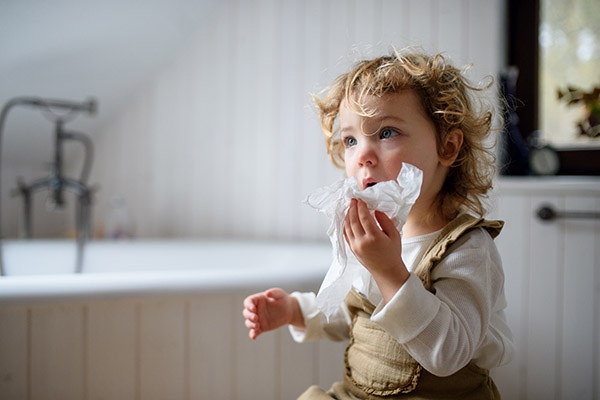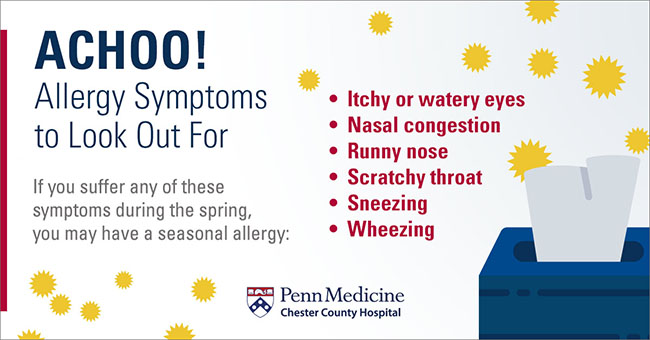
For many kids, seasonal allergies are the pits. They can be unpleasant and difficult to manage. If this is your child, they are not alone. An estimated 7.1 million kids in the United States report environmental allergies.
What Are Seasonal Allergies?
According to Jason Komasz, MD, Medical Director, CHOP Newborn and Pediatric Care at Chester County Hospital, seasonal allergies strike at different times of the year. Also known as allergic rhinitis, or hay fever, seasonal allergy symptoms occur when airborne irritants, or allergens, enter the eyes, nose and throat, setting off an allergic reaction.
"In the spring, flower, and tree pollen are common culprits," Komasz points out. "Grass pollen starts in late spring and peaks in the summer months. Weed pollen (such as ragweed) and mold spores plague kids mainly in the late summer and fall."
Komasz says children need to be exposed to an allergen before they can be allergic to it, so children under two years of age are less likely to have environmental allergies.

Signs Your Child May Have Seasonal Allergies
Symptoms of seasonal allergies include a stuffy or runny nose, sneezing, itchy eyes and nose, sore throat, cough, and dark circles under the eyes.
Seasonal allergies can be more than just a mild annoyance. Some of the consequences of allergies in children include:
- Fatigue and poor concentration in school due to lack of sleep
- An increase in ear and sinus infections
- Asthma exacerbations
- Behavioral issues from discomfort and lack of sleep
How Can You Minimize Exposure to Seasonal Allergy Triggers?
Even when pollen seems to be blanketing everything in its path, there are steps you can take to prevent allergies from acting up:
- Have your child wash their hands and face as soon as they come in from playing outside so they don’t rub pollen in their eyes and nose. Better yet, rinse them off in the shower.
- Check the forecast for pollen levels, and limit outdoor activities when pollen counts are at their highest.
- Dry laundry in the dryer. Since pollen can coat clothing, avoid hanging laundry outside to dry.
- Have your child take their bath at bedtime. This will help with nighttime allergy problems.
- Keep windows in your home and car closed and use air conditioning to filter the air. Make sure the air conditioner is in re-circulating mode.
- Get More Practical Tips to Survive Pollen Season >>
How Do You Treat Seasonal Allergies?
Dr. Komasz says in combination with taking steps to limit your child's exposure to allergy triggers, there are many safe, effective allergy medicines that target specific symptoms your child is struggling with the most.
"Most allergy medications are now over-the-counter and generally fall into the categories of oral antihistamines, nose sprays, and eye drops," he explains. "Below are some key things to know about each type. Be sure to talk to your pediatrician or nurse practitioner about the best options for your child."
Important note: Read labels carefully for the active ingredient and do not give your child more than one oral antihistamine at a time unless under the direction of a healthcare provider. However, most eye drops and nose sprays can be given together along with an oral antihistamine.
Nasal Sprays
There are several types of nasal sprays which may be effective in helping relieve allergy symptoms:
- Nasal saline sprays: Nasal saline sprays help flush out allergen from your nose and can relieve some congestion
- Nasal antihistamine sprays: These help reduce the production of histamine directly in your nose. Histamine release is responsible for the nasal swelling and secretions that occur with allergies
- Nasal steroid sprays: These are a very safe and effective method to reduce nasal inflammation, swelling and mucous production associated with allergies
"All 3 types of these nasal sprays are available over the counter," says Dr. Komasz. "Parents should consult with their child's pediatrician to determine the most effective treatment."
A simple nasal saline spray will flush out allergens and relieve nasal congestion from allergies. Your child's pediatric provider may recommend a medicated nasal spray. Often, steroid nasal sprays are recommended because of their known effectiveness and safety record.
Oral Antihistamines
Oral antihistamines vary by how long they last, how well they help itchiness, and their side effects. During an allergic reaction, antihistamines block one of the agents responsible for producing swelling and secretions in your child’s body, called histamine. The "best" choice is the one that alleviates your child’s symptoms. As a good first choice, if another family member has had success with one antihistamine, genetics suggest your child may respond as well to the same medicine.
A few things to watch for:
- Older, "first generation" antihistamines that have been on the market for a long time can make kids sleepy and don't last very long. Occasionally, kids become "hyper" and are unable to sleep after taking these types of medicines.
- Newer, "second generation" antihistamines cause less sleepiness in your child, last longer and are dosed once per day.
What About Nasal or Oral Decongestants?
Generally nasal decongestants and oral decongestants are avoided because of side effects. Nasal sprays containing decongestants can cause a rebound runny nose called rhinitis medicamentosa and oral decongestants can cause side effects including high blood pressure, insomnia and irritability.
Topical Treatments for Itchy, Swollen, Watery Eyes
For itchy, swollen eyes, oral medication does not tend to work as effectively as topical eye drops. Allergy eye drops generally contain topical antihistamines. Avoid the use of any product that contains a vasoconstrictor (look on the label or ask your pharmacist) for more than two to three days to avoid rebound redness. Rebound redness is the recurrence of symptoms and can lead to eyes becoming “dependent” upon eye drops. Artificial tears will also help soothe irritated eyes.
Ask your pediatrician or nurse practitioner if you are interested in exploring other medication options or in long-term treatments such as immune therapy (allergy shots or sublingual/oral immunotherapy).
Additional Information:
Chester County Hospital is home to CHOP Pediatric Care, and combines the extensive resources of the Children's Hospital of Philadelphia with the strong experience and excellent facilities of Chester County Hospital including its dedicated Pediatric Unit.